What Does the Marketing Department Do in a Company? (10 functions)
Marketing departments are different among companies based on the business size and marketing strategy. Some marketing departments are entirely in-house, […]
Read More »Become a successful marketing consultant: Learn more
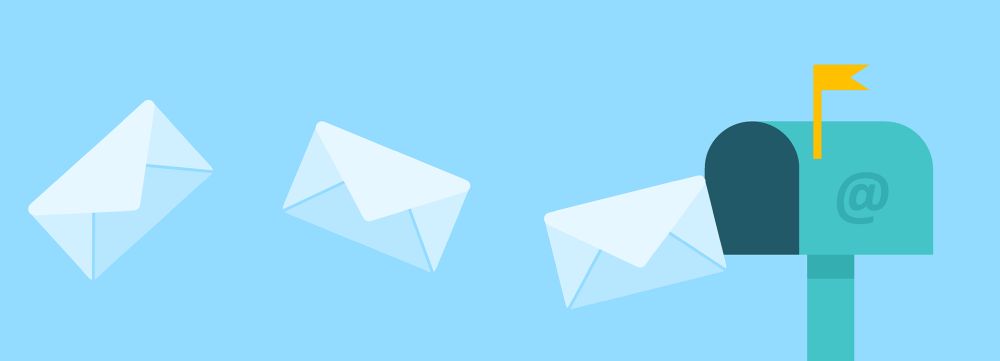
Email marketing is a great way to communicate with your customers and soon-to-be customers.
And when done well, email marketing is a core method that consistently produces great results.
But how do you develop your own email systems to do what email marketing agencies do?
How do I start email marketing?
You can start email marketing by sending email communications to a list of customers and or non-customers. An email marketer sends promotional emails, usually an advertisement about products or services to a list of email customers that is owned by the company.
After all, email is one of the most profitable marketing methods available. This is largely because the cost is relatively low and the people you are communicating with are usually your customers - who already know you, like you and trust you.
But, for best results you need to develop your own in-house email marketing agency correctly. Just because your customers know you, doesn’t mean you can send them a flash sale once a year and send no other form of communication. This may be ‘sending an email’, but it's far from good marketing.
But more about this shortly.
If you already have a list of customers or potential customers, with a few techniques you can start easily communicating your message, promoting your products and services, and quickly start making sales.
If you haven’t started email marketing yet, or are not exactly sure how to get more from your email campaigns, this will be an easy tutorial to help you get started quickly.
If you need help along the way, Your Strategic Marketing Partner is happy to help.
Right now, we are going to focus on what you need to literally be your own in house email marketing agency and successfully send great looking email to your customers.
There are some simple steps that need to be developed first. And there is no reason why you can’t easily manage all your email marketing from your own office, rather than hiring an expensive agency.
Onward to the first step.
Let’s first get some definitions out of the way.
With email for business, there are two basic types:
This is a very important distinction because depending upon the kind of email you are sending, there are strict laws (Can-Spam Act) you must be aware of. If they are broken, you could wind up paying $43,792 per violation. And keep in mind that it does not matter if an agency is managing email marketing for you, you are liable if these rules are broken.
So, let’s say you send 1,000 emails and violate these laws, this could mean you would receive an enormous fine because each email is a potential violation. What if you are sending 100,000 emails? Or more?
Could definitely be a deal killer.
Onward.
Let’s focus this conversation on email marketing for promotional purposes. Again, let’s stay focused on you being your own in-house marketing agency.
Now, let's break promotional these emails into two basic categories:
Automation emails for marketing are emails that you can literally set and forget, requiring minimal management.
Think of them as email drips, where you turn the faucet on and the drips happen until you turn the faucet off, need to clean up a little or get the wrench and tighten things up a bit.
Not too much different from automatic emails.
Newsletter emails are a category of email simply because we all know what a newsletter is.
In the “old days” (a print newsletter may be a critical strategy for you to use today too) we would write it, we print it, put it in an envelope, address it and put a stamp on it.
And just like an email campaign, if we want to send it to 1,000 people we can. Or we can mail just 100 depending upon the recipient.
Email newsletters are no different and the customer segmentation opportunities are just as rich. In fact we highly suggest you make specific programs for your top 5% of customers, top 20%, bottom 80%, haven’t seen you in a while, most recent buyer, most recent biggest buyer on and on. The options are endless.
We will talk more about email list segmentation for email marketing in another topic (this is absolutely golden and cannot be overlooked).
The combination of automated emails and newsletter emails can work magic for you, and when done right, can literally create $1,000’s, $10,000”s, $100,000”s or more in sales -- and deliver a ton of value to your customers.
Before we dig into some campaign ideas, let’s first identify the most important part of any marketing campaign.
This question is also true for an email marketing campaign.
Ask any email marketing agency of any kind this one question,
If a marketing agency says that true success in email is anything other than...
The list
Then you need to walk away.
How do we send email to a list? What format does it need to be in? And how do we segment it for best results?
These are huge questions.
And over time we will do many articles on these topics. We did one advanced strategy which we call our “Lost Sheep” email marketing campaign which you can read about here. But if you are just getting started here are some juicy details.
There are two basic ways to generate a list that you can send email to.
For this conversation we are only to focus on your current list. The second way to generate your email list is to build it through an opt-in process. This is typically through your standard customer process, through a lead generation system or a form(s) on your website.
Keep in mind that the best companies have a regularly growing email list. And if you don’t have one yet, or need help constructing something, please feel free to reach out to us as we are happy to help. Attracting new people into your list requires different systems that initially fall under our Website Marketing and Online Advertising Partner bucket.
Back to our house list.
So, to organize your house list, in most cases, you will simply need to put your existing customer emails into an excel file. This is usually pretty easy to do. For example, if you use a CRM, you can export the list into excel or google sheets and clean up the list once in the spreadsheet.
Here is what a typical list looks like before we get it organized into something useful for email marketing:
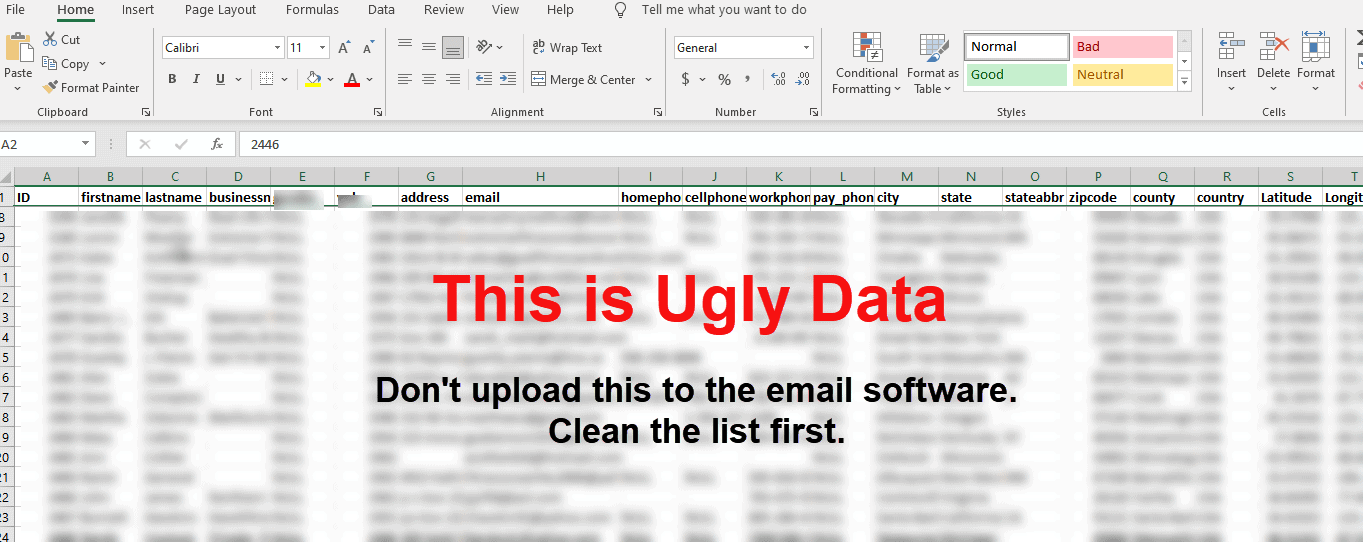
Notice this list is “ugly data” and can’t be used yet. It has many columns with information that your email service provider cannot use.
Our job is to now make it clean and organized:
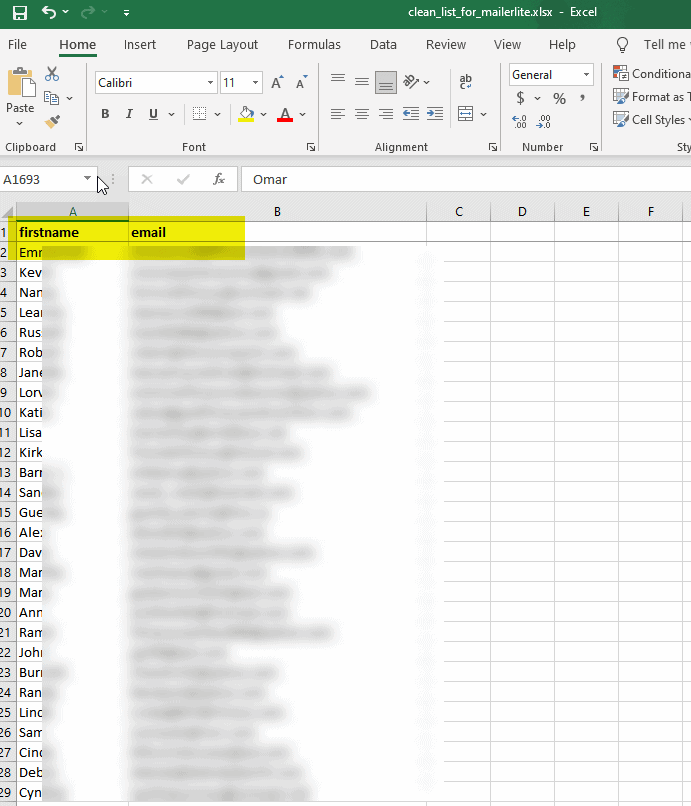
Generally, and depending upon your email marketing goals, you will want to have two columns, one for first name and one for email address.
Keep in mind though, you will need permission to email your customers. Most email service providers will have guidelines on this process. See table below for some email service producers to help you get started.
Now, let’s upload this list into our email software. For this example we are using Mailerlite (see a list of other providers below).

Click “Add subscribers” and then drag and drop your clean excel file list saved as a .csv int the software: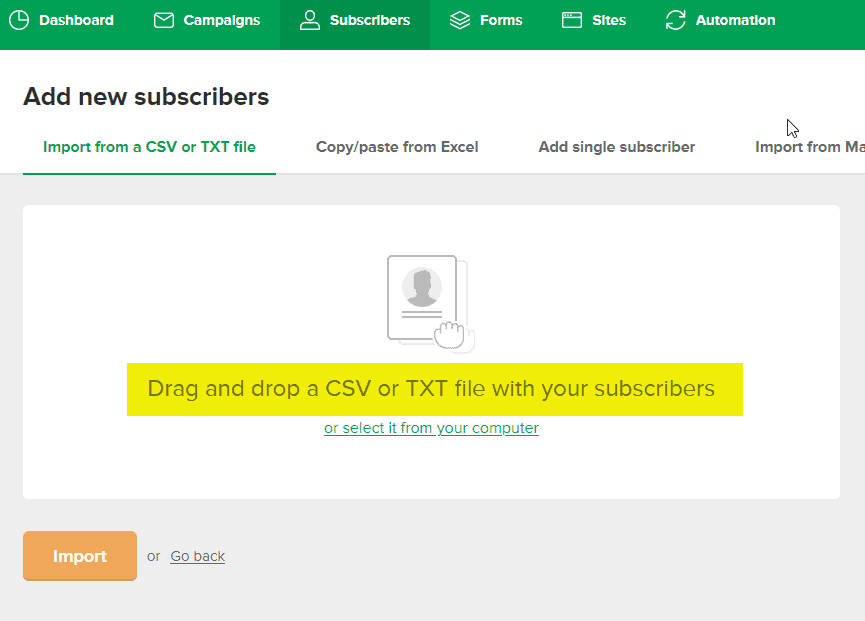 Once the email file is dropped in the software, the software will clean your email list for you. That is, they will remove duplicates and invalid emails and others that they just can’t send to. If successful you will see a page like this showing the status of your imported file and email records:
Once the email file is dropped in the software, the software will clean your email list for you. That is, they will remove duplicates and invalid emails and others that they just can’t send to. If successful you will see a page like this showing the status of your imported file and email records:
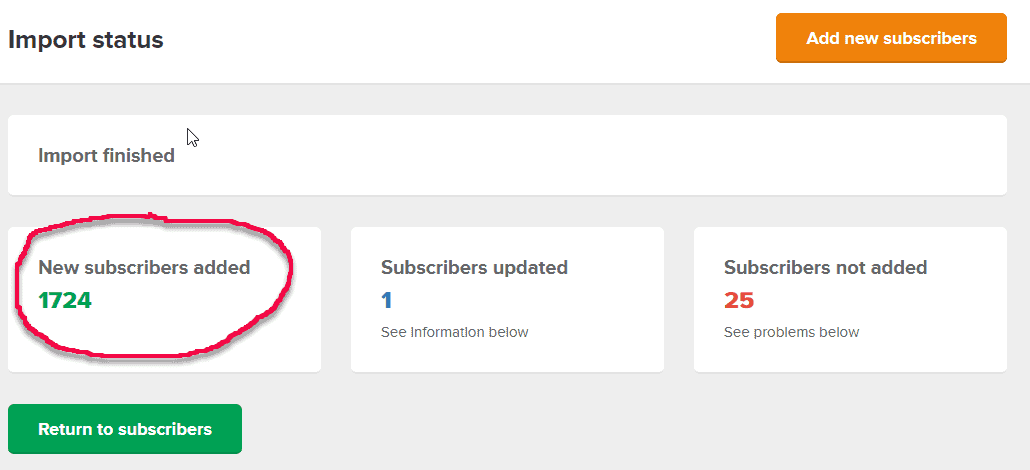
Now for the fun part. We have emails loaded into the software and it's time to communicate a great message to your email list. This is where the rubber meets the road. And where the term, “email marketing agency” creates value.
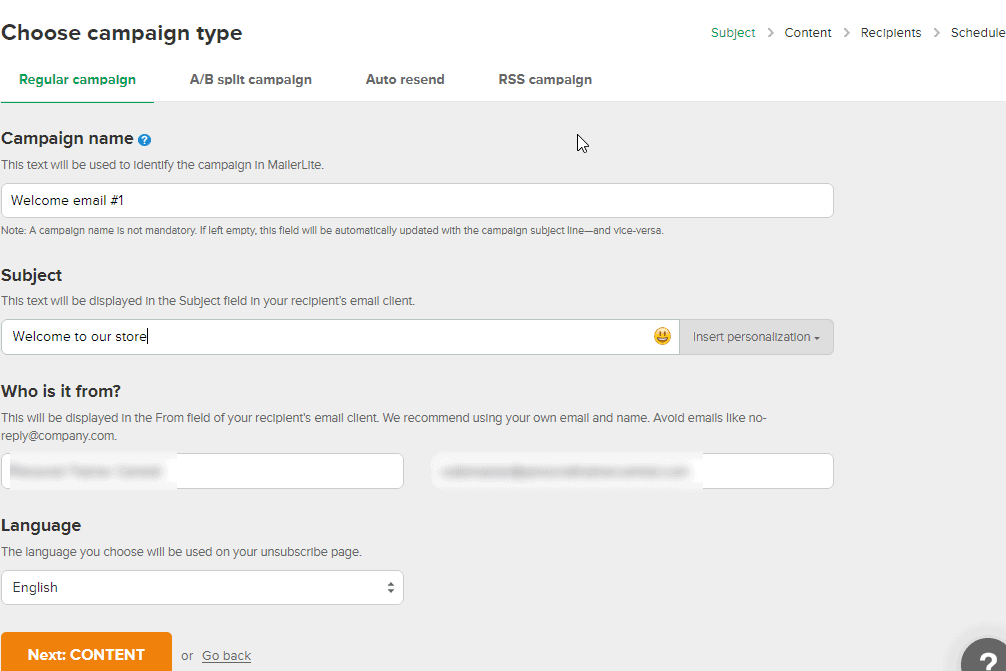
Let’s title your email so you can easily reference it when you look at your emails. If you send 100+ emails per year you need a system to be able to easily manage this process.
Here you set the subject line of your email -- this is what the recipient sees in their email browser, and you can adjust your sender information.
It’s time to develop some email campaigns and create at least some form of an email marketing strategy.
Depending upon the size of the organization, an agency may set up hundreds of automated campaigns running at any given time.
But we are going to discuss three of the highest value email campaigns you should start with.
Now you get to actually build your message to your customer. While you are just getting started, simple is best. It is a good idea to send email just like you were writing to a trusted friend. The more graphics and images you use, it’s very possible the your results will go down. We will talk more about open rates and click thru rates and strategies to increase orders at another time.
Here is a very simple email as a general idea. Notice the text editor, the preheader option (the small amount of “teaser” text the recipient sees below the subject line in the email). Also notice the “unsubscribe” option. This is a default setting that most providers provide and must always be there.
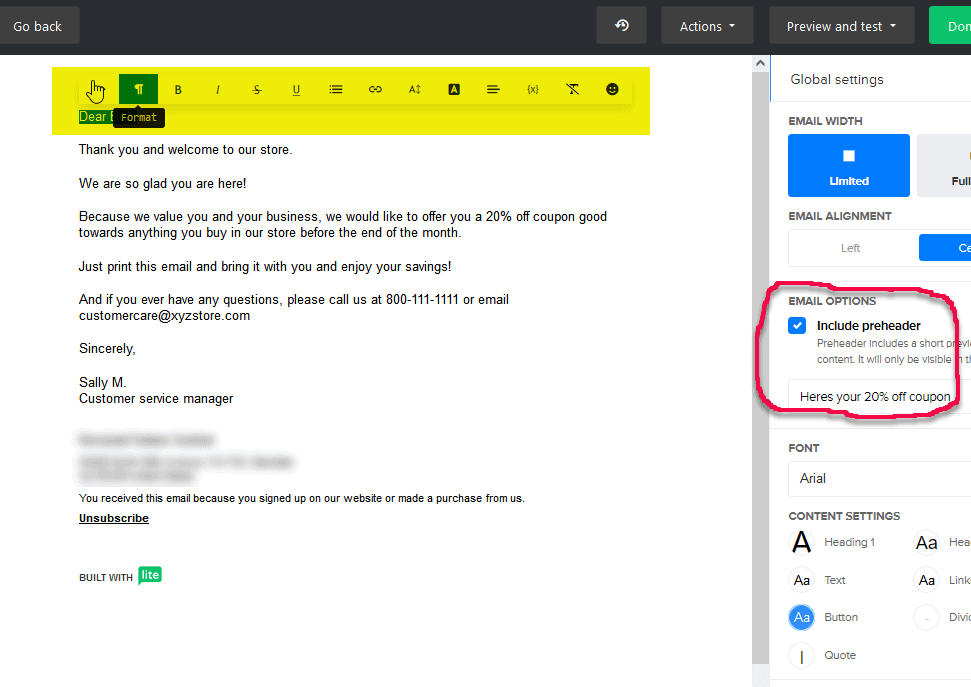 Next, you can confirm who you are sending your email to and then you will be able to send yourself a test email before committing to scheduling our email to be delivered to your list.
Next, you can confirm who you are sending your email to and then you will be able to send yourself a test email before committing to scheduling our email to be delivered to your list.
One note of caution.
Be sure your team is aware of your email schedule.
For example, we have seen emails get sent out by the marketing team and the warehouse or the sales team had no idea why they just got bombarded by 100+ new orders and phone calls within an hour!
While this sounds like a good problem to have, this happens more often than you can imagine.
In a future tutorial we will share some of the results from these campaigns to help you stay focused on the most important metrics as well as learn some tips and strategies for improving your email marketing.
Let’s move on.
How many emails should I send?
When we set up an email strategy for a new client, we aim to send 100 emails a year.
Does that sound like a lot?
It is.
And it isn’t.
100 emails per year is far too many emails if there is no value being delivered to the customer. And if this is the case, your customers will tell you in the form of no sales, unsubscribes, phone calls with complaints and spam reports.
But on the other hand, 100 emails is not enough if you have the habit of over-delivering value to your customers.
Either way, call us and we can help you sort this out and find your optimal number of emails to send.
Why do we start with 100?
Well, first, we might start with one foundational email per week. Maybe it's an education email. A brand-builder email. Or a new product announcement. The options are endless.
One email a week is 52 emails a year.
The more value you deliver via email, the stronger the bond you will have with your customer.
For example, if you simply send one additional email per week, maybe a positive communication, a new blog post, something fun that happened in your office, or a customer success story, you will find that your customers will enjoy hearing from you.
This combination alone is 104 emails per year. Now stack in some specials, discounts, new product announcements and you could easily be delivering 150 or more per year.
But beware.
If you only send one email per year, the fastest way to ruin your customer relationship is to send them a ‘flash sale’-type email.
That behavior is worse than a newbie car salesman asking the customer to purchase before saying “Hi”.
For example, we personally purchased a unique necklace jewelry item from an online boutique jewelry store we learned about from a social media ad. This small company has customers worldwide.
We bought this item two years ago.
We haven’t heard from them since. Not once.
Recently, we received a “Flash Sale” in an email from them asking us to purchase another high end item from them.
At the bottom of the email they said this email is a new thing for them, and they wanted to see how it goes.
While trying something new is admirable and constant market testing is absolutely critical, they made a core marketing mistake in their email strategy.
They should have sent us a sequence of welcome emails right after we bought about how to care for our new purchase. How to store it properly. Ideas for how to wear it. And how other buyers are wearing it. They should have sent some history about the gold and clasps used in the jewelry and then sprinkle in some seasonal sales items, some new product announcements and some fun new developments their team is working on.
Then, when they send out a flash sale email, their customers would be much more likely to respond in a positive way.
Onward.
Start with these three campaigns:
There are many great email software tools. Our favorites for those just getting started are:
Your own in-house email marketing agency can be a game-changer for you. You will have a better relationship with you customers, have more flexibility in your marketing and your team will have a lot of fun developing email marketing campaigns.
And as always, if you need help in setting these campaigns up, Your Strategic Marketing Partner is delighted to help!